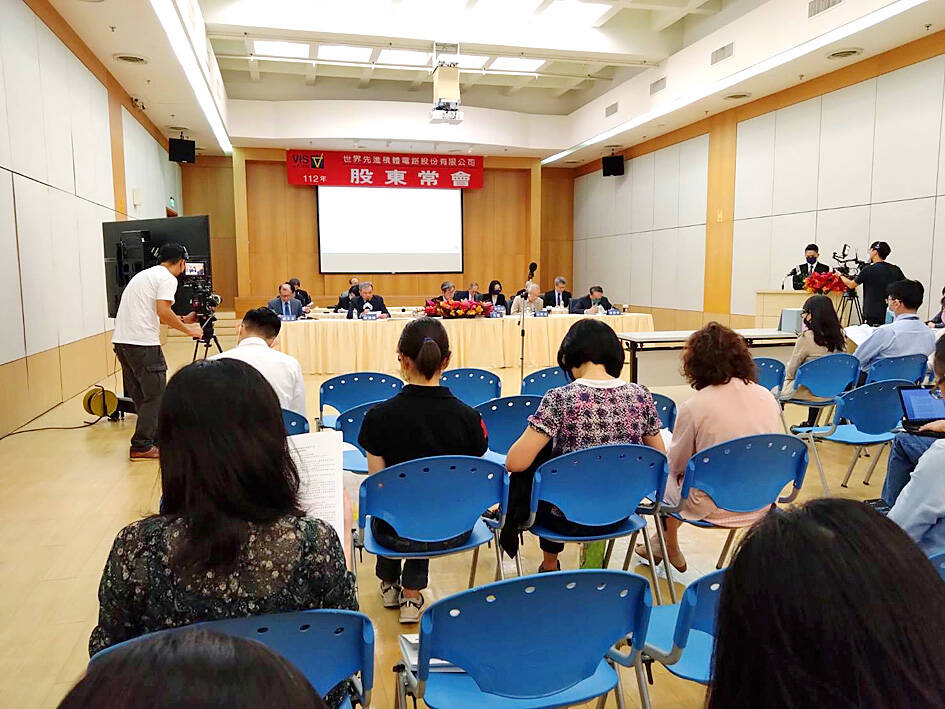Vanguard International Semiconductor Corp (世界先進), a supplier of display driver ICs and power management chips, yesterday said it expects customer demand to recover somewhat in the second half of this year as channel inventory adjustments are likely to end this quarter.
However, consumers would remain cautious about spending on electronics and other nonessential items, Vanguard chairman Fang Leuh (方略) told reporters after the company’s annual general meeting, citing high inflationary pressures around the world and global central banks’ rate-hike cycle.
“We are hoping to see a mild recovery in the second half,” Fang said. “But the strength of the recovery will be affected by greater uncertainties compared with three months ago. The second half will be a better period than the first half.”

Photo: Grace Hung, Taipei Times
At its investors’ conference last month, Vanguard said it was “positive” that a rebound would arrive in the second half after bottoming out this quarter, although the chipmaker also said it was not sure about the scale of the recovery due to low order visibility.
At yesterday’s shareholders’ meeting, Vanguard said that shipments this year would shrink about 21 percent to 2.46 million 8-inch wafers, compared with 3.15 million last year, citing a Gartner Inc forecast that said global semiconductor revenue would fall by an annual rate of 6.5 percent this year to US$562.7 billion.
Demand for chips used in the auto industry, data centers and high-performance computing devices would be stable this year, Vanguard said in its annual report.
In the long run, power management chips would continue to be the growth driver of 8-inch fabs, it said.
Demand for 8-inch wafers is expected to exceed supply in the long term, said Vanguard, which operates four 8-inch fabs in Taiwan and one in Singapore.
Shareholders yesterday approved a cash distribution of NT$4.5 per common share, the same as last year. That represented a payout ratio of 49.61 percent based on earnings per share of NT$9.07 last year.
The cash dividend meant a dividend yield of 4.86 percent, based on the company’s closing stock price of NT$92.5 yesterday.
Vanguard posted record-high net profit of NT$15.28 billion (US$497.5 million) last year, up 27 percent from 2021, as revenue rose 17.62 percent to NT$51.69 billion.
However, amid a downtrend in the semiconductor industry this year, the company’s cumulative revenue in the first five months declined 36.06 percent from a year earlier to NT$14.9 billion, Vanguard said last week.

CHIP WAR: Tariffs on Taiwanese chips would prompt companies to move their factories, but not necessarily to the US, unleashing a ‘global cross-sector tariff war’ US President Donald Trump would “shoot himself in the foot” if he follows through on his recent pledge to impose higher tariffs on Taiwanese and other foreign semiconductors entering the US, analysts said. Trump’s plans to raise tariffs on chips manufactured in Taiwan to as high as 100 percent would backfire, macroeconomist Henry Wu (吳嘉隆) said. He would “shoot himself in the foot,” Wu said on Saturday, as such economic measures would lead Taiwanese chip suppliers to pass on additional costs to their US clients and consumers, and ultimately cause another wave of inflation. Trump has claimed that Taiwan took up to

A start-up in Mexico is trying to help get a handle on one coastal city’s plastic waste problem by converting it into gasoline, diesel and other fuels. With less than 10 percent of the world’s plastics being recycled, Petgas’ idea is that rather than letting discarded plastic become waste, it can become productive again as fuel. Petgas developed a machine in the port city of Boca del Rio that uses pyrolysis, a thermodynamic process that heats plastics in the absence of oxygen, breaking it down to produce gasoline, diesel, kerosene, paraffin and coke. Petgas chief technology officer Carlos Parraguirre Diaz said that in

SUPPORT: The government said it would help firms deal with supply disruptions, after Trump signed orders imposing tariffs of 25 percent on imports from Canada and Mexico The government pledged to help companies with operations in Mexico, such as iPhone assembler Hon Hai Precision Industry Co (鴻海精密), also known as Foxconn Technology Group (富士康科技集團), shift production lines and investment if needed to deal with higher US tariffs. The Ministry of Economic Affairs yesterday announced measures to help local firms cope with the US tariff increases on Canada, Mexico, China and other potential areas. The ministry said that it would establish an investment and trade service center in the US to help Taiwanese firms assess the investment environment in different US states, plan supply chain relocation strategies and

Japan intends to closely monitor the impact on its currency of US President Donald Trump’s new tariffs and is worried about the international fallout from the trade imposts, Japanese Minister of Finance Katsunobu Kato said. “We need to carefully see how the exchange rate and other factors will be affected and what form US monetary policy will take in the future,” Kato said yesterday in an interview with Fuji Television. Japan is very concerned about how the tariffs might impact the global economy, he added. Kato spoke as nations and firms brace for potential repercussions after Trump unleashed the first salvo of